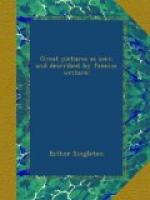A. Highest on the left side, looking to the window. The life of St. Francis begins in his renunciation of the world.
B. Highest on the right side. His new life is approved and ordained by the authority of the church.
C. Central on the left side. He preaches to his own disciples.
D. Central on the right side. He preaches to the heathen.
E. Lowest on the left side. His burial.
F. Lowest on the right side. His power after death.
Besides these six subjects, there are, on the sides of the window, the four great Franciscan saints, St. Louis of France, St. Louis of Toulouse, St. Clare, and St. Elizabeth of Hungary. The Soldan, with an ordinary opera-glass, you may see clearly enough; and I think it will be first well to notice some technical points in it.
If the little virgin on the stairs of the temple reminded you of one composition of Titian’s, this Soldan should, I think, remind you of all that is greatest in Titian; so forcibly, indeed, that for my own part, if I had been told that a careful early fresco by Titian had been recovered in Santa Croce, I could have believed both report and my own eyes, more quickly than I have been able to admit that this is indeed by Giotto. It is so great that—had its principles been understood—there was in reality nothing more to be taught of art in Italy; nothing to be invented afterwards except Dutch effects of light.
That there is “no effect of light” here arrived at, I beg you at once to observe as a most important lesson. The subject is St. Francis challenging the Soldan’s Magi,—fire-worshippers—to pass with him through the fire, which is blazing red at his feet. It is so hot that the two Magi on the other side of the throne shield their faces. But it is represented simply as a red mass of writhing forms of flame; and casts no firelight whatever. There is no ruling colour on anybody’s nose; there are no black shadows under anybody’s chin; there are no Rembrandtesque gradations of gloom, or glitterings of sword-hilt and armour.
Is this ignorance, think you, in Giotto, and pure artlessness? He was now a man in middle life, having passed all his days in painting, and professedly, and almost contentiously, painting things as he saw them. Do you suppose he never saw fire cast firelight?—and he the friend of Dante! who of all poets is the most subtle in his sense of every kind of effect of light—though he has been thought by the public to know that of fire only. Again and again, his ghosts wonder that there is no shadow cast by Dante’s body; and is the poet’s friend because a painter, likely, therefore, not to have known that mortal substance casts shadow, and terrestrial flame, light? Nay, the passage in the Purgatorio where the shadows from the morning sunshine make the flames redder, reaches the accuracy of Newtonian science, and does Giotto, think you, all the while, see nothing of the sort?




